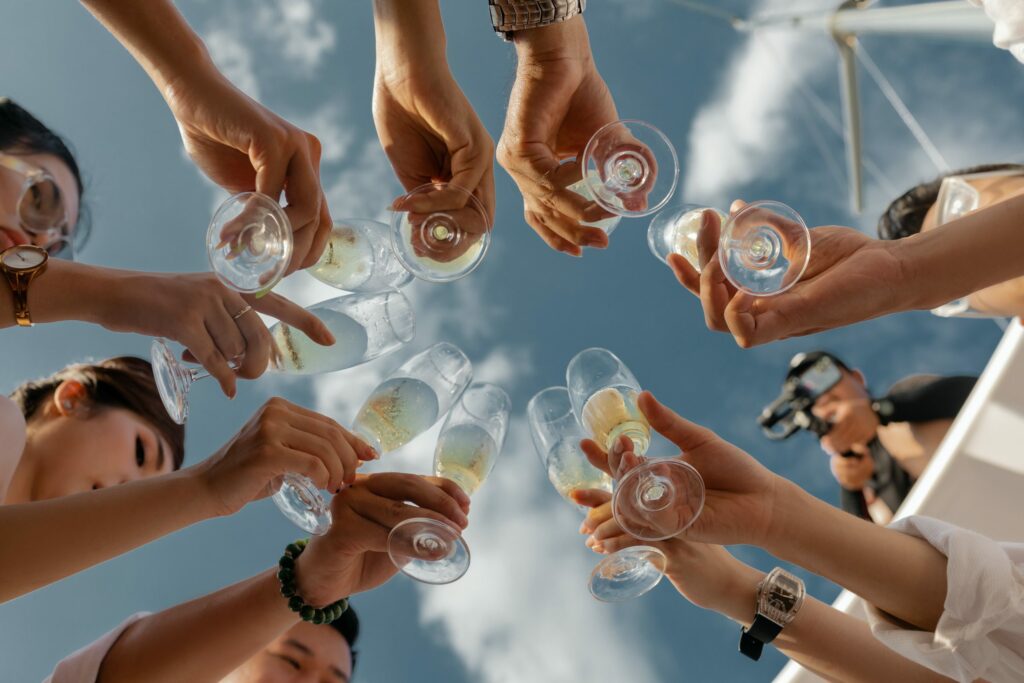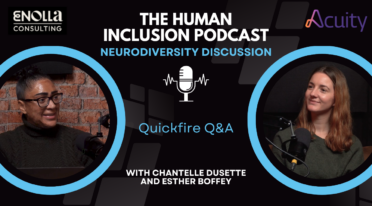“Why aren’t you drinking?”

Normalising sobriety at work
Religion, pregnancy, health, personal choice – there are several reasons why someone might not be drinking alcohol. But, particularly in the UK, it still seems to be the only drug we have to justify NOT taking…
In 2022 I decided to make a change in my life by giving up alcohol. This was sparked by me mainly wanting to be more health conscious, but also to change my relationship with alcohol and to improve my overall mental well-being.
The first few weeks of sobriety were easy. I didn’t have many social events in my diary. I focused on fitness and using my increased energy levels to get outdoors as much as possible, try new hobbies, and wake up early to catch the sunrise and enjoy being surrounded by nature.
It all sounds very wholesome doesn’t it, and you know what it was. I’d like to think that those cool, calm mornings were where I felt the most content, where I fully embraced the challenge of not drinking and began to actually enjoy it and reap the benefits. I felt cushioned, safe, and light in my alcohol-free bubble and couldn’t stop raving to all my friends and family about how energised I was feeling.
I started to wonder, is this a new me? Can I do this forever?
However, the real challenge started when my social calendar started filling up. I thought the difficult part would be finding a 0% beer that didn’t taste awful and listening to repetitive stories of those who were drinking(!), but it was actually the constant questions that took me by surprise. From the first social event I attended, the barrage of unwelcomed questions began…
But WHY aren’t you drinking?
Are you pregnant?
Can’t you just have one?
Are you trying for a baby?
Isn’t it really boring though?
Did you have a real problem with booze then?
But what’s the REAL reason you’re not drinking?
Albeit, I’m sure a lot of it was well-intended and people were curious, it was draining and it surprised me that people were so fascinated by me choosing not to have an alcoholic drink. I also realised that when you go sober having previously been a drinker, a lot of people assume you had a serious problem or must have been an alcoholic to have made such a drastic change.
I eventually accepted the invasive questioning and comments as a part of going sober but, despite feeling amazing from a health perspective, it did sometimes make me wonder if it would be easier to ‘just’ have a drink and I really started to empathise with those who didn’t drink due to other reasons that are much more personal, as I imagine some of the questions could be really triggering.
And it seems I’m not alone. When sharing my sobriety experience on LinkedIn, over 1,400 people either reacted to, commented on or re-shared my post which made me feel even more passionately about supporting others and educating on this topic!
As an individual, what can you do to help?
If someone you know has given up drinking, or perhaps they’ve always been sober, there’s ways you can support them without judgement:
- If you know this was a tough decision, tell them you’re proud of them! Remind them of the positive changes you’re seeing.
- Take the time to understand why this is important to them, but avoid assumptions and asking any personal questions, especially if it’s not someone you’re close with.
- Never peer pressure them into drinking with you.
- Take it even further and go sober for a night with them! You might even be tempted to give up yourself.
As an employer, what can you do to help?
Whether you’re part of the HR team, a line manager or even brand new to a business, you can always play a part in your workplace becoming more inclusive for non-drinkers:
- When organising social events, get creative! Instead of the pub, why not try something new like a cookery class, inflatable games or something fitness related? Some of my favourite memories have involved very random activities!
- Beer fridge in the office? Mix it up with plenty of non-alcoholic options too.
- Educate your colleagues on topics related to alcohol such as Addiction, Mental Health, Religion, Pregnancy and more. Acuity and our sister brand, Stanton House, have introduced our own Empathy Series, where our brave colleagues have shared their experiences, this has helped to foster an environment of empathy, respect and understanding.
- If you are planning a social event that involves alcohol, call the venue in advance to ensure there are plenty of soft drink options beyond water. If they don’t and you’re stuck for ideas, ask them if you’re able to bring some along instead.
- Normalise people not wanting to drink at social events or, even better, not wanting to socialise in their own personal time. Of course, it’s important to get to know your colleagues, but don’t form an opinion on someone based on how much they join their colleagues at the pub. We’ve all heard of the recent case in France and how that went down…
The benefits of normalising sobriety in the world of work
Alcohol consumption has been a common practice in many organizations in the UK for years, especially during business events or after-work gatherings. However, reducing the amount of alcohol focussed socials within an organisation can have some amazing benefits for everyone.
More diversity – According to a survey conducted by Drinkaware, 57% of UK adults drink alcohol at least once a week. However, obviously, not everyone drinks, and it is essential to recognise that some people may feel uncomfortable or excluded in social situations where alcohol is present. By promoting a non-drinking culture, organisations can create a more inclusive environment where everyone feels welcome and accepted.
Better mental and physical health – According to the UK Chief Medical Officers’ guidelines, regularly drinking over the low-risk drinking guidelines (14 units per week) can increase the risk of developing a range of health problems, including liver disease and cancer. By promoting a non-drinking culture, organisations can help employees prioritise their health and well-being. This, in turn, can lead to better overall job performance and productivity.
Less sick days – According to a survey conducted by the Chartered Institute of Personnel and Development (CIPD), nearly a third of UK employees have attended work while under the influence of alcohol. Additionally, excessive alcohol consumption can lead to hangovers and alcohol-related illnesses, which can lead to increased absenteeism and reduced productivity in the workplace. By promoting a non-drinking culture, organisations can help reduce sick days and improve overall productivity.
Happier employees – According to a survey conducted by YouGov, 35% of UK employees have experienced negative effects on their mental health due to drinking. By promoting a non-drinking culture, organisations can help create a happier and more positive workplace environment. Employees who feel supported in their decision not to drink are more likely to feel valued and respected, leading to increased job satisfaction and overall happiness.
Increased productivity – According to a study conducted by the Institute of Alcohol Studies (IAS), alcohol consumption can impair judgment and cognitive function, leading to reduced productivity and poor decision-making. By promoting a non-drinking culture, organisations can help ensure that employees are alert and focused while at work. This, in turn, can lead to better job performance and increased productivity.
In conclusion, promoting a non-drinking culture in organisations in the UK can have several benefits, including creating a more inclusive environment, improving mental and physical health, reducing sick days, creating happier employees, and increasing productivity. By recognising the benefits of non-drinking and creating a supportive environment, organisations can help their employees prioritise their health and well-being while also creating a more productive and positive workplace culture.
As for me, going sober for nearly 6 months completely changed my relationship with alcohol and, honestly, gave me a different perspective on life. I do still enjoy a bottle of red with dinner and love the odd night out, but it isn’t such a significant part of my social calendar anymore and I have much healthier boundaries…aka I find it much easier to say a polite “no thank you” to things that aren’t aligned with my goals or happiness. It’s no magic wand, but it was a very important piece of the puzzle for me to find balance and calm.
Please note: Everything in this article is based on personal experience and should not be taken as medical advice. For some people, quitting drinking could be dangerous and should be carried out under medical supervision. If you are concerned that you or someone you care about has a problem, there are people you can talk to. Please consult a medical professional, your GP, or use some of these phone numbers and links for free and confidential advice: https://www.drinkaware.co.uk/advice/alcohol-support-services/support-lines
Additional support & resources
Books
• The Sober Girl Society Handbook – Millie Gooch (this book inspired me to go sober!)
• How to be a Mindful Drinker – Club Soda Community
• Sober Curious – Ruby Warrington
• The Naked Mind – Annie Grace
• Alcohol Explained – William Porter
Podcasts
• Love Sober
• Sober Curious
• This Naked Mind
Alcohol-Free Venues
• Redemption Bar, London, UK
• Listen Bar, New York City, New York, USA
• Cafe Sobar, Nottingham, UK
• Sans Bar, Austin, Texas, USA
• Yada Bar, Derby, UK
• The Brink, Liverpool, UK
• The Virgin Mary, Dublin, Ireland
Sober Events
https://www.eventbrite.co.uk/d/united-kingdom–city-of-london/sober-events/
https://www.eventbrite.com/o/sober-girl-society-21728722753
The latest thinking from around Acuity




